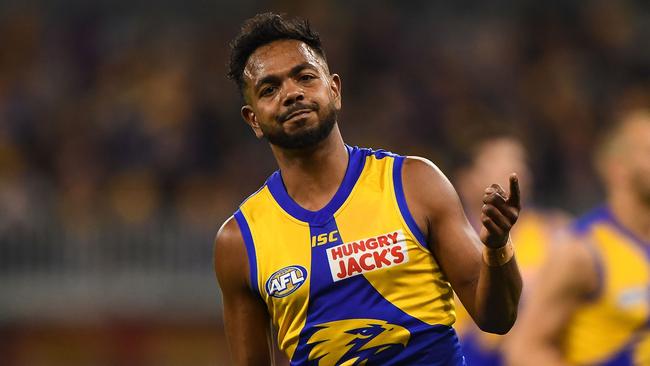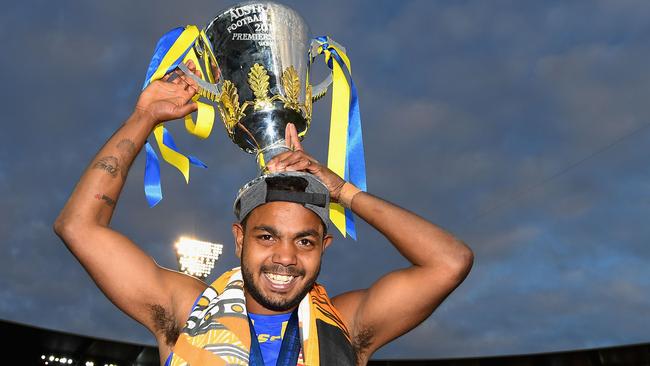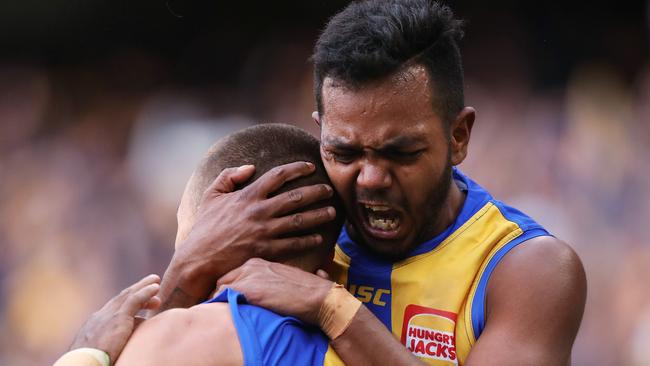Willie Rioli drug test saga: How did this even happen? The questions that need answering
What happened when Willie Rioli was asked for a urine sample? Why was he allowed to carry on playing for so many weeks? Is his career over? We answer the burning questions after his shock ban.
West Coast
Don't miss out on the headlines from West Coast. Followed categories will be added to My News.
Willie Rioli is facing a potential four-year ban due to an adverse finding for urine substitution in an anti-doping test.
On Thursday, the league’s general counsel Andrew Dillon announced a joint AFL- investigation would be launched to determine how, what West Coast football chief Craig Vozzo characterised as “something other than urine”, came to be in Rioli’s sample jarduring an anti-doping test on August 20.
A number of questions remain unanswered.
Sam Edmund and former boss Richard Ings (speaking on SEN) give their take on the on going scandal.
West Coast star Willie Rioli provisionally suspended for duping anti-doping officers
Why wasn’t Rioli watched/was he as per guidelines?
Edmund: He was, by at least one “chaperone” - an ASADA official charged with observing the athlete at all time while another officer fills out the paperwork and administers the test.
Ings: This happens because you have a very observant control officer who is facilitating the test. The doping control officer is there to witness the sample being provided. If there is any abnormalities, if there’s any indication of any adulteration of the sample then the doping control officer will report it, it will be investigated and charges potentially laid. We don’t have all the details but what we do know is that ASADA is alleging that there was a substitution or a substitution attempt at the point of collection that was clearly picked up by the doping control officer. It has been investigated, the sample has been tested for something which isn’t urine and the process is proceeding accordingly.

What would have happened when they observed something was off in the test?
Ings: The doping control officer won’t go to an athlete who is substitution urine and go ‘no, no, no mate you can’t do that, you’ve got to give us the right stuff’. The attempt to substitute is a violation in itself so the doping control officer will simply collect the sample, report the incident and leave it for the authorities at ASADA to investigate.
Who would have witnessed the test?
Ings: Within the doping control room you’ve got the player, you’ve got anybody who is invited there by the player to witness the testing and you’ve got the doping control officer. It’s a very small group. So we don’t know what was said between the parties but I think it’s very safe to assume that the doping control officer must have seen something untowards and that it was reported directly to ASADA. The sample tested for something that wasn’t urine and that has triggered the investigation and allegation of a tampering and substitution offense.
It’s very possible that the doping control officer may have indicated that there making a report of something that they’ve seen, there are concerns, it would have been noted on the doping control form. That’s very, very possible. But at the end of the day the doping control officer has apparently done their job, they have noticed something untoward going on and reported it for investigation.
Why did he need to submit something not urine? What could he be covering up?
Edmund: Who knows? But whatever it might be, it would have been nowhere near as serious as the charge of manipulating a sample. The haunting fact is that if Rioli tested positive to an illicit substance, ASADA wouldn’t have batted an eyelid.

Who is at fault besides Rioli?
Edmund: At this point, no one.
Why was he allowed to keep playing?
Edmund: There’s a process to follow. While outsiders may claim this has taken too long to come to light given Rioli was tested on August 20, former CEO Richard Ings was stunned by the speed of it.
Ings: Well it’s incredibly fast. I mean the test was only literally a few weeks ago. We’re not used to these matters moving this quickly, which would strongly suggest to me that this was a pretty clear case for ASADA to commence a prosecution.
How did he think he would get away with this?
Edmund: The million dollar question. But perhaps panic overrides any common sense.
Will we find out what the substance actually was?
Ings: I’m unsure if we will find out any more details. This is a matter that will wind through the AFL process, undoubtedly there will be a hearing, and there will be an AFL tribunal. If a guilty verdict is handed down there will a judgement which will eventually be made public and it’s in that judgement that we will get more detail.

What’s the reality here? Irrespective 4 years for tampering?
Edmund: The maximum penalty is four years which would be catastrophic for Rioli. The matter will now go to the AFL’s independent tribunal where David Grace QC will defend him and ASADA will argue its case for fault.
Ings: This would be considered very seriously. This is an unusual case, we are used to positive drugs test coming through. This is the first case in quite some time of tampering of a sample, certainly at this level. It’s a very, very serious allegation. It’s viewed as the most serious violation of rules and can carry up to a four year ban.
Can he fight the ban?
Ings: Well there is no real ability for the AFL itself to water down anything. These matters go to the AFL’s independent anti-doping tribunal, the evidence is heard, ASADA argues its case for fault, David Grace is an exceptional counsel will defend Willie Rioli and the tribunal at the AFL will make its decision, which can then be appealed of course as we’ve seen with Essendon to the court of arbitration fo sport.
If it’s a match day test it’s for performance enhancing not illicit drugs so what does that indicate?
Edmund: ASADA test on match days and during the week. The only way he can get in real strife with ASADA is for performance enhancing drugs. If Willie Rioli tested positive for illicit drugs on match day he would follow the same path as Collingwood’s Sam Murray. If he tests positive for illicit drugs on match day, or any day, he’s obviously in big trouble. If he tests positive for illicit on a Dorevitch test he gets a strike.
Originally published as Willie Rioli drug test saga: How did this even happen? The questions that need answering
